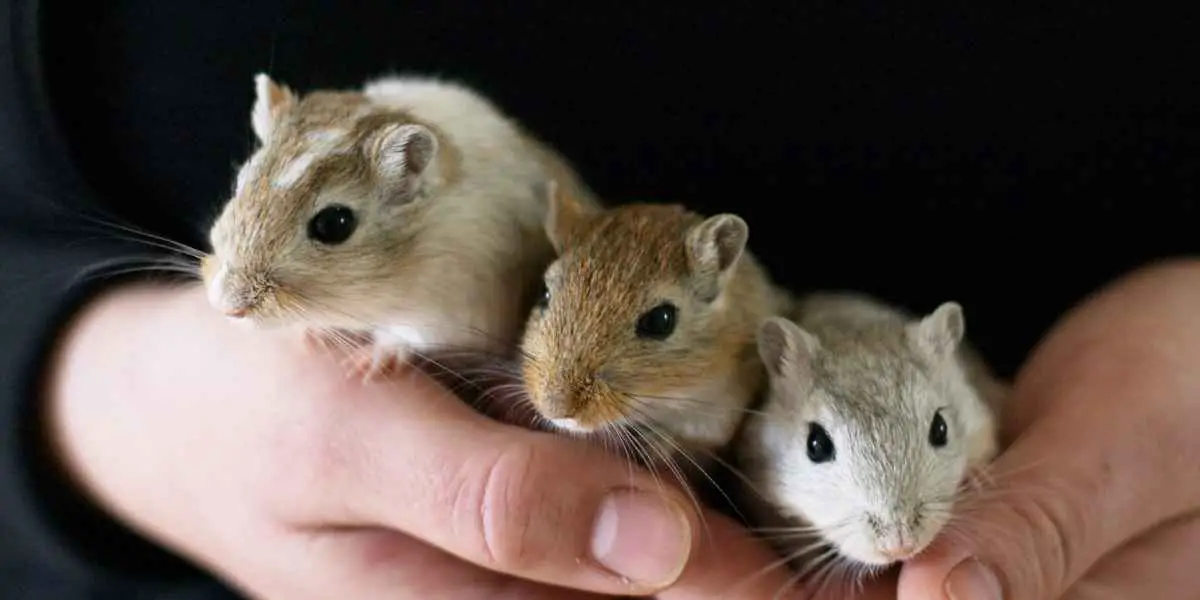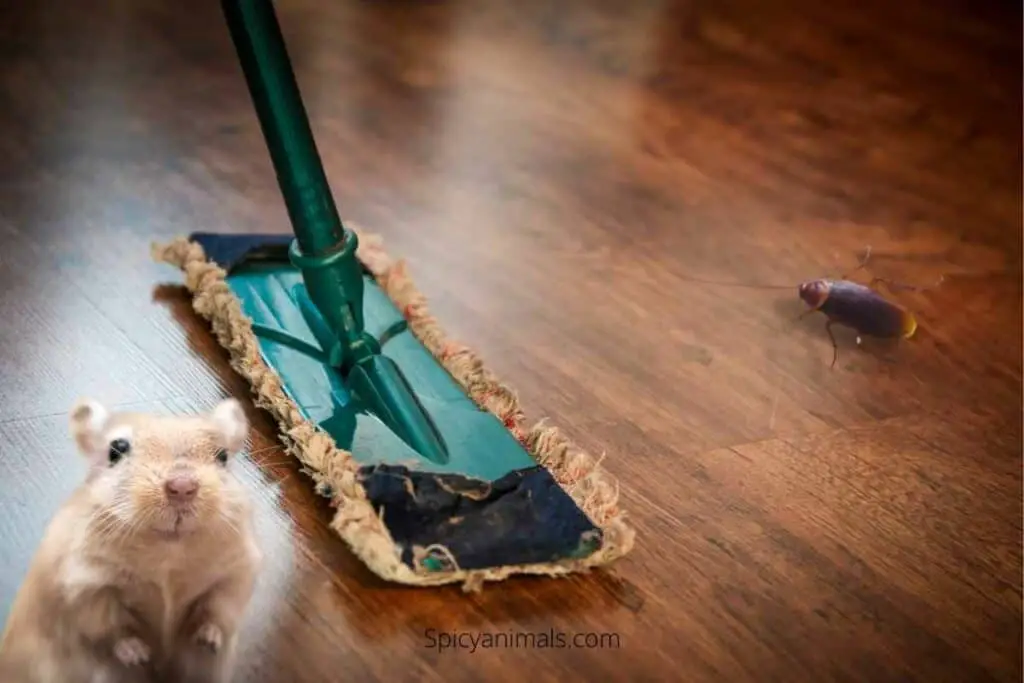To ensure the well-being of baby gerbils, it is crucial to separate them from their mother and opposite-sex siblings before they reach sexual maturity. Although most baby gerbils are weaned by five weeks old and can survive if separated then, it is recommended to wait until they are eight weeks old for their health and happiness. During the first few weeks, baby gerbils may not know how to use a water bottle, wheel, or forage for food, so separating them at eight weeks ensures they have the necessary skills.
Table of Contents
When Can Baby Gerbils Leave Their Mother?
When it comes to baby gerbils, there are several important reasons why you need to separate them from their mother and opposite-sex siblings before they reach sexual maturity. This separation is crucial for their health and happiness. Let’s take a look at why it’s necessary to separate baby gerbils at the appropriate time.
Separate before sexual maturity
It is important to separate baby gerbils before they reach sexual maturity to prevent unwanted breeding. Gerbils can reproduce at a surprisingly young age, and if left together, they can have multiple litters in a short period of time. Separating them early on ensures that they do not breed with their siblings or parents, which can lead to genetic problems and overcrowding.
Separate before reaching eight weeks old
Most baby gerbils can leave their mother and survive independently when they reach six weeks old. However, it is recommended to separate them at eight weeks old for their overall well-being. By this age, they have had more time to learn important skills and develop socially and emotionally. Separating them too early may leave them unprepared and vulnerable.
Separate to ensure health and happiness
Separating baby gerbils is key to ensuring their health and happiness. When left together for too long, they may become stressed or territorial, leading to fighting and injury. Additionally, separating them allows each gerbil to have their own space and resources, reducing the risk of competition for food, water, and shelter. By separating them, you are creating a healthier and more harmonious environment for each gerbil.

Timing of Separation
Now that we understand the importance of separating baby gerbils, let’s explore the optimal timing for this separation process. It’s essential to consider their age and developmental milestones to determine the right time for separation.
Gerbils can leave their mother at six weeks old
Baby gerbils can leave their mother when they reach six weeks old. At this age, they have typically learned basic skills and are capable of surviving independently. However, it is still recommended to wait a little longer before separating them to ensure their transition is smooth and successful.
Weaning occurs around five weeks old
The weaning process for baby gerbils usually occurs around five weeks old. At this point, they have started eating solid food and are less dependent on their mother’s milk for sustenance. While they may be physically capable of surviving on their own, they might lack certain skills necessary for their well-being.
Recommended separation at eight weeks old
To ensure that baby gerbils are fully prepared for life on their own, it is generally recommended to separate them at eight weeks old. By this age, they have had ample time to develop important skills and behaviors, making their transition easier. Separating them too early may result in them struggling to adapt to their new environment.
Methods of Separation
There are a few different methods you can utilize to separate baby gerbils effectively. These methods involve separating the father and male pups or placing the pups and parents into same-sex pairings.
Separate father and male pups in another tank
One method of separation involves moving the father and male pups to another tank. This allows you to keep the male gerbils together while creating separate living spaces for them. By doing this, you prevent any potential breeding between the father and his male offspring while still providing them with the social interaction they need.
Put pups and parents into same-sex pairings
Alternatively, you can separate the baby gerbils by putting them and their parents into same-sex pairings. This means placing the mother and female pups in one tank and the father and male pups in another. By doing so, you prevent any further breeding while preserving the familial bonds between the baby gerbils and their parents.
Development of Baby Gerbils
Separating baby gerbils at the appropriate age is crucial for their development. While they may be weaned around five weeks old, there are certain skills and behaviors that they may not have fully developed yet. Separating them at eight weeks old ensures that they can thrive and be proficient in various aspects of gerbil life.
Pups may not know how to use water bottle, wheel, or forage for food
Even though baby gerbils are weaned at around five weeks old, they may not have fully mastered essential skills such as using a water bottle, running in a wheel, or foraging for food. These skills are essential for their health and well-being. By allowing them to stay with their parents for a longer period, they can learn from their parents and develop these skills more effectively.
Separation at eight weeks ensures proficient skills
By separating baby gerbils at eight weeks old, you are ensuring that they have had enough time to observe and learn from their parents. This allows them to acquire important skills such as using a water bottle, exercising on a wheel, and finding food on their own. The extra weeks spent with their parents contribute to their overall development and help them become proficient in these crucial skills.
Importance of Sexing Gerbil Pups
Before separating baby gerbils, it is essential to determine their gender. Sexing the gerbil pups allows you to separate them accordingly and prevent unwanted breeding. It is crucial to perform this step before the separation process to maintain a controlled and responsible gerbil population.
Prevents unwanted breeding
Sexing gerbil pups prevents any potential breeding between siblings or parents. Breeding between family members can result in genetic issues and overcrowding, which can significantly impact the health and well-being of the gerbils. By accurately determining the gender of the pups, you can avoid any accidental breeding in the future.
Determine gender before separation
To ensure an effective separation, it is essential to determine the gender of the gerbil pups before initiating the process. There are various methods to sex gerbils, such as observing the distance between their anus and genital opening or consulting a veterinarian. By sexing the pups beforehand, you can avoid any confusion or potential mistakes during the separation process.
Separation and Litter Timing
If you have multiple litters of baby gerbils, it is important to consider the timing of their separation. Whether you decide to separate the first litter before or after the second litter is born, each approach has its own advantages and considerations.
Separate first litter before or after the second litter
When it comes to separating baby gerbils from multiple litters, you have the option to separate the first litter either before or after the second litter is born. Both approaches are acceptable, but each has its own implications.
If you choose to separate the first litter before the second litter is born, it allows the mother gerbil to focus solely on the care of the second litter without any distractions. This approach ensures that each litter receives the proper attention and care from the mother.
On the other hand, separating the first litter after the second litter is born allows the gerbils to remain together for a more extended period. This can provide additional social interaction and support among the siblings, which can be beneficial for their overall development.
Timing options for separation
The timing of separating the litters depends on various factors, such as the health and well-being of the mother gerbil, the age of the first litter, and the availability of separate enclosures. It is crucial to monitor the situation closely and assess the best timing for separation based on these factors.
Remember, the well-being and development of the baby gerbils should be your top priority when determining the most appropriate timing for their separation.
Pairing of Separated Gerbils
Once baby gerbils are separated, it is important to pair them with appropriate companions for their continued growth and socialization. Pairing them with same-sex adult gerbils or setting up breeding pairs with gerbils from another family are two common approaches.
Pair with same-sex adult gerbils for proper behavior
After separating baby gerbils, it is beneficial to pair them with same-sex adult gerbils to ensure proper behavioral development. By observing and learning from the adults’ behavior, the young gerbils can acquire essential social and survival skills. This pairing promotes a healthy and natural gerbil environment while facilitating their continued growth.
Set up breeding pairs with gerbils from another family
For those interested in breeding gerbils, setting up breeding pairs with gerbils from another family is an option. This approach ensures genetic diversity and prevents inbreeding, which can result in health issues. However, it requires careful planning, monitoring, and a deeper understanding of gerbil genetics and breeding practices.
When considering the pairing of separated gerbils, it is essential to provide adequate space, resources, and appropriate introductions for a successful integration. Monitoring their interactions and ensuring their well-being are crucial steps in establishing harmonious gerbil pairs.
In conclusion, separating baby gerbils at the right time is crucial for their health, happiness, and overall development. By understanding the reasons for separation, the optimal timing, the methods involved, and the importance of sexing gerbil pups, you can ensure that your baby gerbils thrive in their new environments. Additionally, considering the timing of separation with regards to litters and making informed pairings of separated gerbils are important steps for responsible gerbil ownership. With proper care and attention, your baby gerbils will grow into happy, healthy, and well-adjusted adults.




